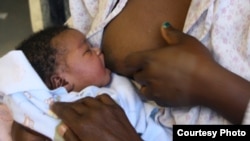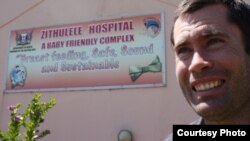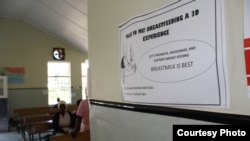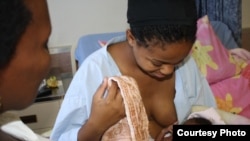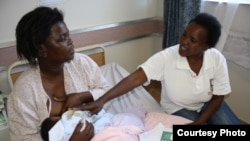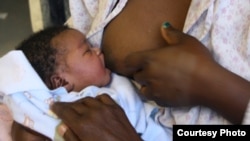This is Part Three of a five-part series on Child Health in South Africa
Continue to Parts: 1 / 2 / 4 / 5
ZIDINDI, SOUTh AFRICA -- In September last year, South Africa’s health minister Aaron Motsoaledi implemented a drastic and highly contentious measure.
He announced that the government would no longer provide a free six-month supply of formula milk to HIV-infected mothers. Instead, its health facilities would encourage the women to exclusively breastfeed for at least the first six months of their babies’ lives. That is, to give their infants nothing to eat or drink other than breast milk – not even water.
In a country with the most people infected with HIV in the world, Motsoaledi’s decision was controversial, because it’s the breast milk of HIV-positive mothers that contains the virus. Critics slammed the minister as irresponsible, saying his policy would place many babies at risk of getting HIV.
But doctors at a hospital in an isolated part of South Africa’s Eastern Cape province praised the minister’s action as brave and visionary and said it would ultimately result in many lives being saved.
In fact, Zithulele Hospital in Oliver Tambo District has advocated exclusive breastfeeding since 2006, in an area where one out of every four mothers is infected with HIV.
“These women worry that they’re going to give their babies HIV through their breast milk. And that is a risk; one has to acknowledge that,” said Dr. Ben Gaunt, Zithulele’s head doctor. But, he maintained, this risk is far lower than the chances of their infants eventually falling ill, or dying, of malnutrition, pneumonia or diarrhea.
Every year, thousands of South African children die of these preventable illnesses, which are exacerbated by poverty and inadequate public health services.
Breast milk contains a mother’s antibodies that ward off these sicknesses. But feeding babies younger than six months mixes of breast milk, formula feed, solid food and water makes them much more vulnerable to potentially fatal illnesses, including HIV, Gaunt insisted. Medical studies prove that babies who are mixed fed by HIV-infected mothers are up to five times more likely to contract the virus.
Doctors say the additional substances damage the sensitive lining of the infants' intestines, which protects them against infection.
According to the Handbook of HIV Medicine, written by international HIV experts to guide doctors who are treating the condition, an infant fed formula is six times more likely to die of an infectious disease in the first two months of life than a baby who’s breastfed.
“Are some children going to get HIV because their HIV-positive mothers are breastfeeding them? Unfortunately, yes,” said Gaunt, while adding, “But the policy is going to save so many other young lives that it makes total sense to implement it.”
Three casualties
Gaunt’s wife, Taryn, is also a doctor at Zithulele Hospital and co-heads its pediatric HIV section. She said the clinic has seen only three babies who were born HIV-negative become HIV-positive while being breastfed in the past five years.
Her husband responded, “That’s distressing; it’s distressing for everyone. (But) that is public health policy; there are going to be people who don’t have an optimal outcome because of the choices that we’ve made. But we have to accept that for the vast majority of people, if they were to follow that (exclusive breastfeeding) policy the outcome will be better.”
However, none of the three youngsters who contracted HIV through breastfeeding at Zithulele were given Nevirapine. Medical researchers have found that if infected mothers breastfeed their babies exclusively for six months and give the infants a daily dose of this antiretroviral drug, the risk of them getting the virus reduces from about 20 percent to less than two percent.
It’s been government policy since April 2010 to provide HIV-infected mothers who are breastfeeding with Nevirapine. Another of the hospital’s doctors, Liz Gatley, said, “As far as I know we haven’t yet had a baby that’s become positive while breastfeeding (and taking) the Nevirapine syrup.”
Breastfeeding triumphs
When Gatley began working at Zithulele three years ago, she said she couldn’t find a single mother who was exclusively breastfeeding. But now she said the practice is common among women attending the hospital’s HIV clinic.
“I know it’s a bold thing to say but I would say 80 percent or more of those women, almost all of them are breastfeeding – exclusively breastfeeding.”
Dr. Taryn Gaunt maintained that this figure is closer to nine out of every 10 mothers who are now only giving breast milk to their infants for half a year, in conjunction with Nevirapine, mainly because they’re terrified of passing HIV on to their children.
Gatley agreed that fear of their kids getting infectious diseases is a “huge motivating factor” encouraging the women to solely breastfeed. “I asked one woman, ‘Why are you different? Why are you only giving your child milk from your breast?’ And she said she’d seen so many babies that weren’t breastfed die of something as simple as diarrhea,” she said.
Ben Gaunt and his colleagues meticulously explain the consequences of feeding children substances other than breast milk to mothers. Most other public hospitals in South Africa don’t offer this level of intensive, time consuming counseling. The result, said Gatley, is that many mothers in the country and even in Oliver Tambo District continue to mix feed, opening their babies up to possibly life-threatening diseases.
Mixed feeding common
A study by South Africa’s Medical Research Council shows that mothers in the country rarely breastfeed exclusively. According to the report, only one out of 10 infants in South Africa is solely breastfed by three months of age; this decreases to only two percent of six-month-old babies.
This ensures that breastfeeding remains a dangerous practice for HIV-infected mothers, when they don’t do it exclusively. Then the possibility of their babies contracting HIV from them magnifies significantly.
The experience of the health workers of Zithulele in Oliver Tambo District supports this research.
“Almost all the women in this area can’t afford to formula feed. So they dilute the formula, they mix it with (porridge) which is not appropriate for a tiny baby. They sometimes give the babies flour and water. And those babies come in (to hospital) sick,” said Gatley.
Many babies she sees have severe malnutrition, and she said this is directly as a result of their not being breastfed. “They get really swollen and their skin starts peeling and those patients are usually quite sick. And they’ve reached the end of their ability to compensate,” explained Gatley.
Ben Gaunt lamented that mixed feeding starts extremely early in South Africa, with mothers feeding solid mixes to babies as young as three weeks.
“A three week old doesn’t have a gut that can handle solids. We hear about all kinds of horrible feeding practices -- everything from women using teaspoons of flour to make the water look white because they can’t afford formula,” said Gaunt.
To make matters worse, babies are more often than not given water -- water that in underdeveloped parts of South Africa is usually polluted.
“Every single water source here is contaminated, which isn’t a surprise because 80 percent of the people use the forest as a toilet. So once the rains come, it washes (feces) out into the rivers,” said Gaunt.
A disaster
Ncedisa Paul, a healthcare advisor working for the Philani NGO in Oliver Tambo District, praised Zithulele Hospital’s achievements in getting women who visit the facility to exclusively breastfeed.
But, she added, she sees a far different reality on the ground in the region.
“Almost all the mothers that I visit mix feed because of a lack of support and the stigma attached to HIV infection,” said Paul. She pointed out that word had in recent years spread around the area that exclusively breastfeeding is a “sure indication” that someone is HIV-positive.
“Those mothers are discriminated against in all sorts of horrible ways so they end up mix feeding their babies, to try to convince people that they’re not HIV-positive, or to keep their status secret. When this happens, they usually pass the HIV on to their babies. It’s a disaster here in this place,” Paul said.
Status and advertising
Another problem in the district and across South Africa, she added, is that feeding babies expensive formula milk is a powerful status symbol.
“The mothers think they are very grand if they feed their babies formula, and mothers who breastfeed are seen as low members of society. So you find many poor mothers going into heavy debt just to keep their babies supplied with formula,” said Paul.
She’s also convinced that intensive advertising campaigns by international companies manufacturing formula milk are seriously damaging South Africa’s efforts to get mothers to breastfeed.
“Mothers see the adverts for milk formula and on the company posters there are these photos of smiling, fat babies. The mothers see that fat child and immediately they think formula is best and they stop breastfeeding,” said Paul.
Yet despite the factors counting against the success of the exclusive breastfeeding policy in South Africa, Dr. Ben Gaunt remains optimistic.
“It’ll work,” he insisted. “It’ll work when we get all public hospitals on board to advocate it properly. It’ll eventually save many, many lives and we’ll reach a point where we’ll wonder why it wasn’t instituted two decades ago.”




